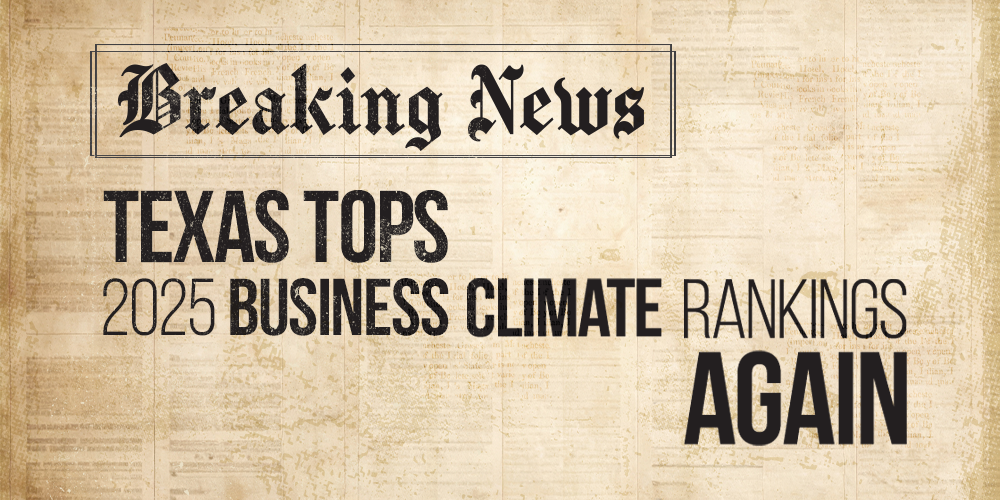The eighth-largest economy in the world has the best business climate in the U.S. Texas has once again emerged as the state most likely to succeed when it comes to attracting capital investment from the private sector. That’s because from the governor’s office in Austin to economic development offices in communities large and small across the Lone Star State, those charged with marketing Texas know they have an easy sell — no corporate tax, sensible business regulations, business-dedicated courts, unbeatable logistics infrastructure and a huge labor force, among other factors. Their challenge is to keep it that way.
North Carolina finishes in second place by a mere single point, followed by Georgia. Virginia and Florida complete the top five states.
Like last year, utilities (availability, cost, reliability) is the most important location criterion for readers responding to a business climate survey earlier this year. (See the Methodology on p. 107 for the components used in the business climate ranking index.) That stands to reason as rampant data center development in metros of all sizes drains power from local and regional supplies, and the data centers themselves require more power for AI computing. (Wait till data centers dedicated to quantum computing come online.) Texas Governor Greg Abbott addresses this issue in the Q&A in this report.
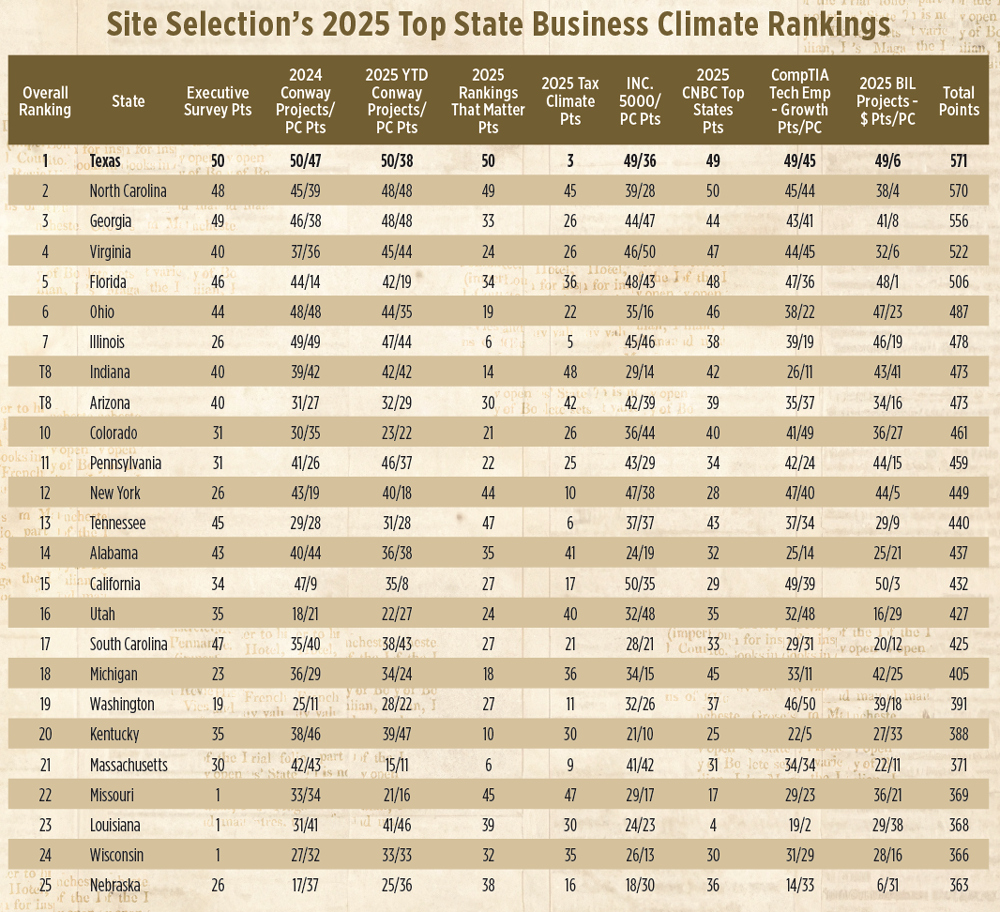
Source: Conway Data Projects Database
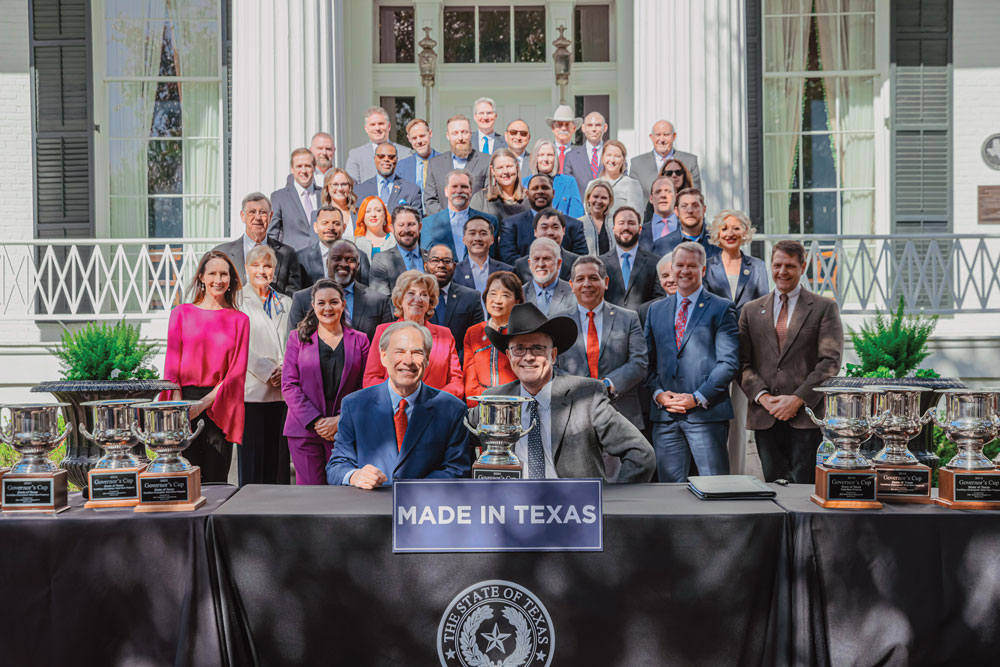
Texas Governor Greg Abbott accepts his 13th consecutive Governor’s Cup from Site Selection magazine in March.
Photos courtesy of the Office of the Governor
Rounding out the top five most important criteria for business executives from a list of options are ease of permitting and regulatory procedures, transportation infrastructure, workforce skills and quality of life. Survey respondents were asked to provide comments about what’s most on their minds as they consider state business climates they’re familiar with. Following are sample responses:
- “Ease of process; expertise of state and local representatives in supporting economic development projects; location quality; workforce; thriving economy with growth sectors; port, transportation and incentives.”
- “Customer demand, power availability and a potential workforce that can be leveraged.”
- “Tax structure: The most significant advantage is its tax policy. Texas has no corporate income tax and no personal income tax. This provides a direct and substantial financial benefit, allowing companies to reinvest more of their earnings into their operations and expansion.”
- “Large and growing workforce: The state boasts a large, diverse, and rapidly growing labor pool. This continuous influx of talent provides companies with the human capital they need to scale their operations effectively.”
- “Business-friendly regulatory environment: Texas has a well-established reputation for having a predictable and streamlined regulatory framework. This reduces bureaucratic hurdles and makes it easier for businesses to operate and expand without unnecessary delays or costs.”
- “Workforce, site readiness and availability of energy, infrastructure assets, pro-business tax and regulatory policies.”
- “Pro-business climate, reasonable tax policies, speed to market, variety of ready sites.”
A recent addition to the Business Climate Ranking methodology is where the Inc. 5000 companies — the fastest-growing private companies in America — are located. Fast-growing companies can’t grow quickly where they will be burdened by over-reaching regulations, uncooperative state and local agencies or taxation schemes that stymie growth. The methodology recognizes states for total Inc. 5000 companies resident and the number located in-state per capita. See the charts on the following pages.
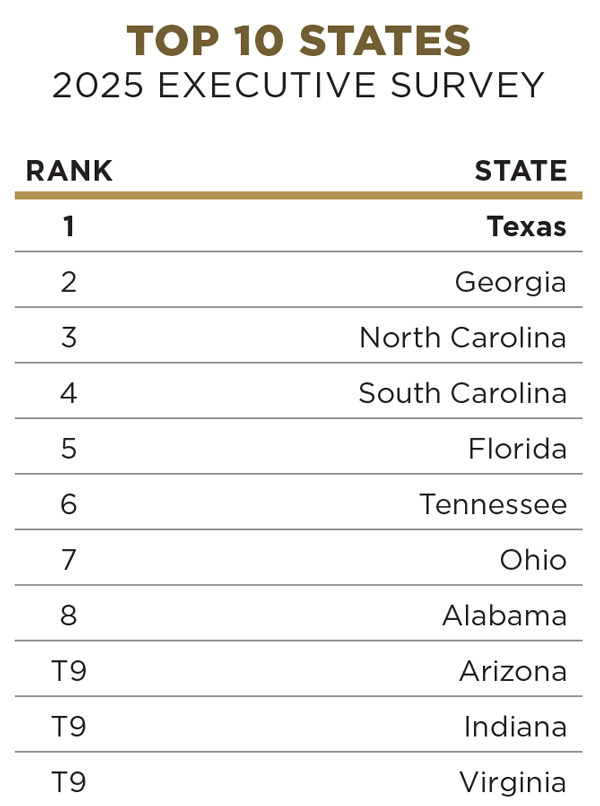
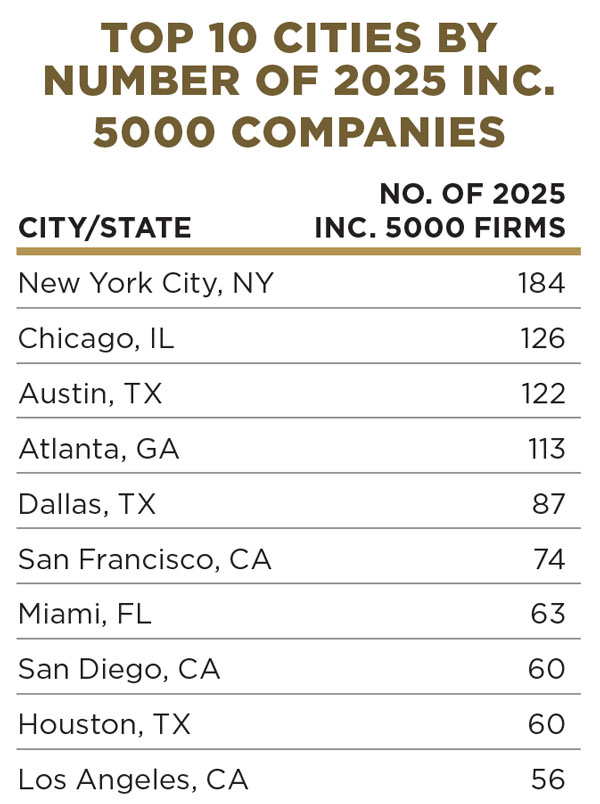

Since becoming the 48th governor of Texas in 2015, Greg Abbott has worked tirelessly to make his state companies’ first choice when considering locations for new or expanding facilities. It’s working. Having won Site Selection’s Governor’s Cup for total capital investment projects for the 13th consecutive year earlier in 2025, the governor and his economic development team, and economic development professionals throughout the state, once again can remind investors that Texas has the best business climate in the nation.
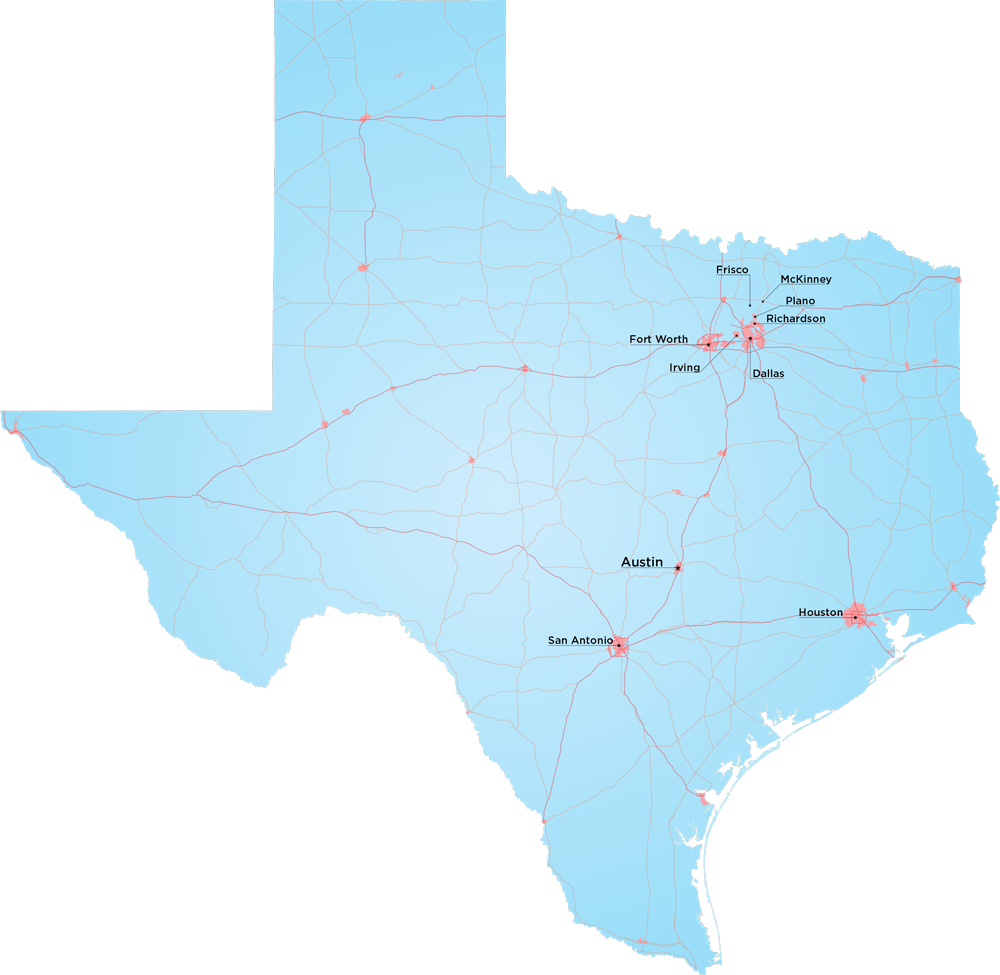
In the following interview, Gov. Abbott explains how Texas continues to outshine the rest of the country in keeping the state front and center on the radars of corporate site selectors.
In September, you named a director of the new Texas Regulatory Efficiency Office. What are the areas this office is charged with addressing?
Gov. Greg Abbott: Here in Texas, we operate at the speed of business, and the new Texas Regulatory Efficiency Office (TREO) will ensure we continue to foster economic opportunity and protect individual liberty. Earlier this year, I signed Senate Bill 14 into law establishing TREO, which is charged with reducing regulatory burdens, eliminating unnecessary rules and promoting economic growth by making Texas even more business friendly. By cutting red tape and rooting out unnecessary regulations, we will make state government more responsive and more efficient to serve the people and job creators of Texas.
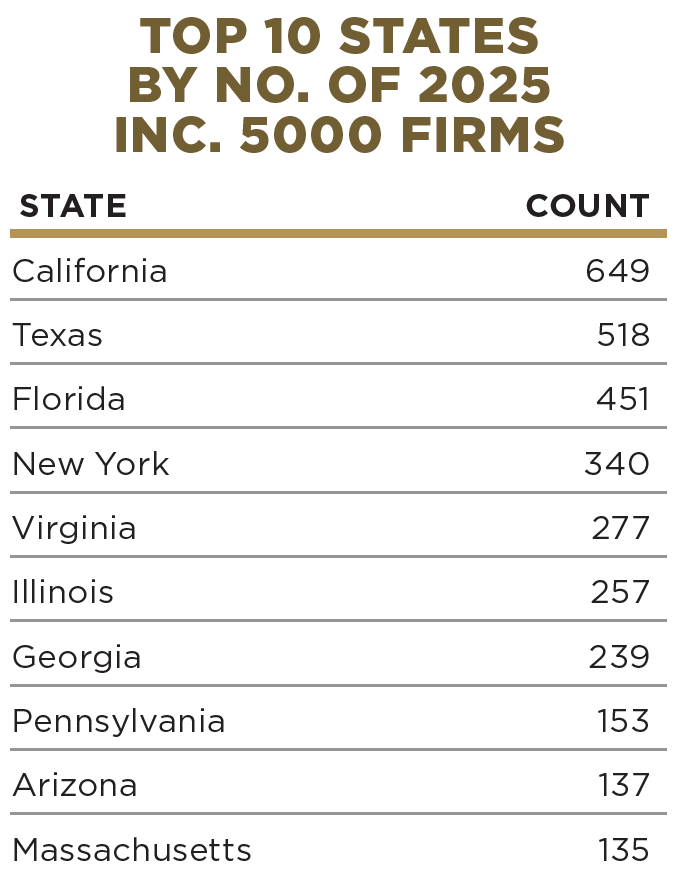
What are some specific outcomes you are looking for it to achieve?
Abbott: TREO will work to increase transparency for Texas taxpayers and ensure that Texas remains the best place to start and run a business in the country. TREO will follow the work started by my Small Business Freedom Council that I launched in 2024 to review government efficiency for Texas businesses.
The office will review state agency rules and procedures and coordinate with an advisory panel of experts and stakeholders to solicit input from Texans and members of the community. TREO will help state agencies identify and cut unnecessary or ineffective rules, determine the regulatory costs placed on Texans, and issue best-practice guidelines for how state agencies adopt new rules and perform required analyses such as cost and employment impact statements.

Governor Abbott discusses how his office is working to streamline business regulations at a Greater Waco Chamber of Commerce event in September.
Photos courtesy of the Office of the Governor
Senate Bill 29 addresses business climate head on. It provides business decision-makers the certainty that sound business judgments made in the best interest of shareholders will not be second-guessed by courts. Is this an issue potential capital investors raised with you or the Office of Economic Development?
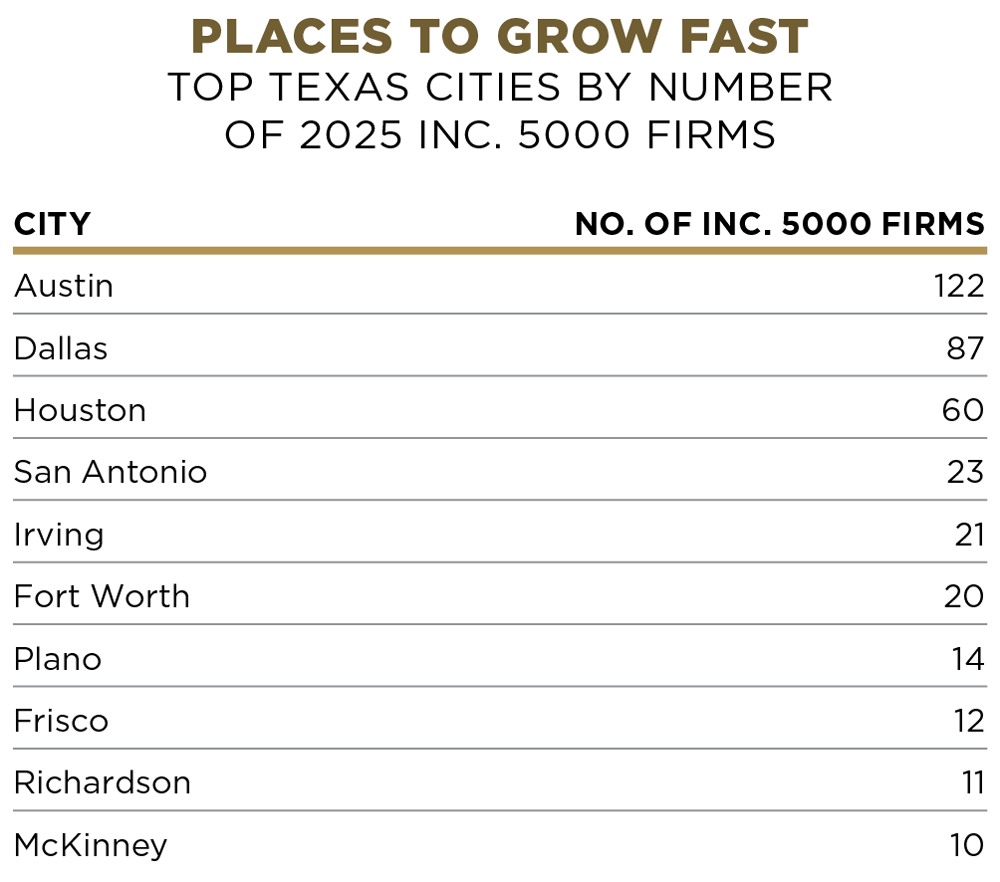
Abbott: Here in Texas, we have experienced unprecedented economic development success over the past decade, but we cannot become complacent. To remain the economic envy of America, we must continue to improve our leading business climate. That’s why I signed Senate Bill 29 into law to provide business decision-makers the certainty that sound business judgments made in the best interest of shareholders will not be second-guessed by courts.
Business decisions are to be made by the elected officers and shareholders, not by unelected judges. The new law codifies the business judgment rule and reforms derivative claims processes. It also creates a mechanism to pre-assess corporate director independence. This will help attract even more corporate registrations and relocations to our state while solidifying Texas as a premier global business destination.
Are there likely to be challenges about how “sound” is defined?
Abbott: This year, I also signed House Bill 40 into law to expand the jurisdiction of Texas business courts and the types of cases they can hear. After years serving as a Texas Supreme Court Justice and Attorney General of Texas, this new law will allow for the Texas judicial system to move more efficiently for businesses. If the definition of a “sound” business decision is challenged in a judicial context, this legislation allows more complex litigation to be tried in the Texas business courts system.
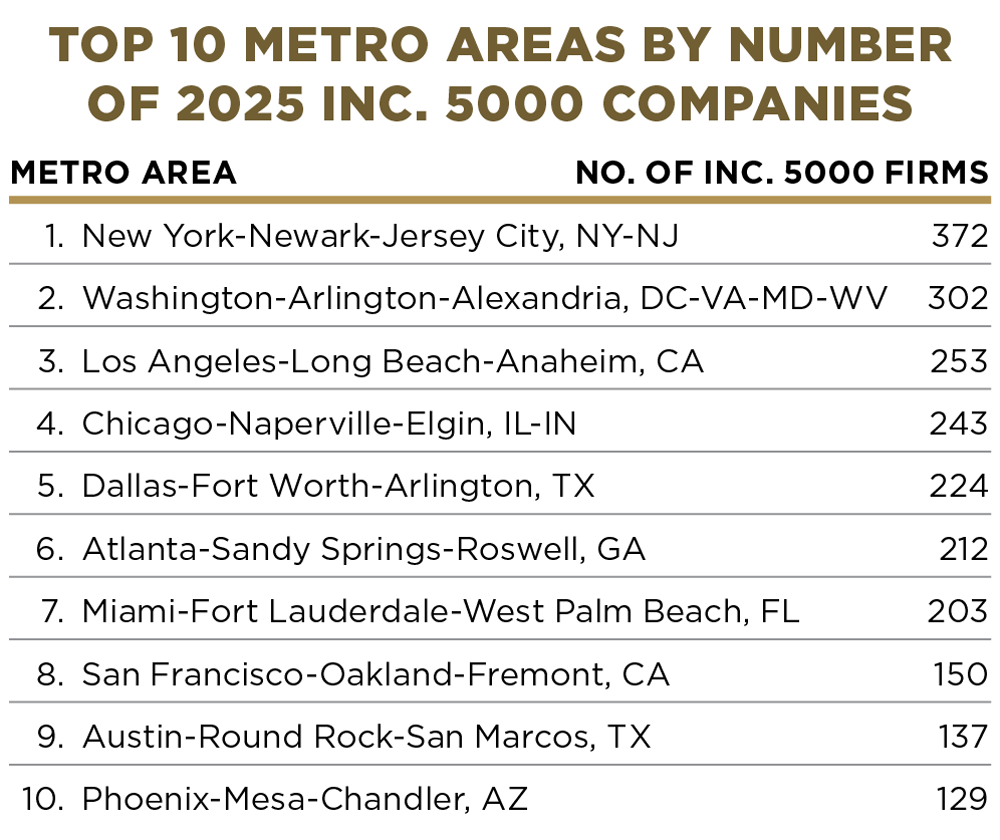
At the Waco State of the State luncheon in early September, you mentioned the 89th Legislative Session cut red tape and fortified Texas’ electric grid. What are some examples of red tape that was cut?
Abbott: In addition to signing the Texas Regulatory Efficiency Office into law, we also streamlined regulations and expanded opportunities for small businesses in Texas.
In June, I signed numerous laws to support Texas’ small business owners and workers and accelerate the process for starting a business by cutting unnecessary government regulations. These laws build upon the progress of my Small Business Freedom Council, which I launched in 2024, to review government efficiency for Texas businesses. I also directed state agencies to provide recommendations to cut unnecessary government regulations that hamper small business formation, operation or growth.
In terms of the electric grid, much is being made lately of rapidly increasing demand for electricity driven by so many new data centers and energy-intensive industrial products (semiconductors and EV plants) coming online. What should readers know about how Texas is addressing this?
Abbott: Texas is the energy capital of the world. We produce more energy and more electricity than any other state in the nation. As more people choose to raise their families and build their businesses in Texas, we continue to add more dispatchable power to our state power grid and make strategic investments in critical infrastructure. In fact, Texas voters approved $5 billion for the Texas Energy Fund for low-interest loans to support the construction of new dispatchable generation.
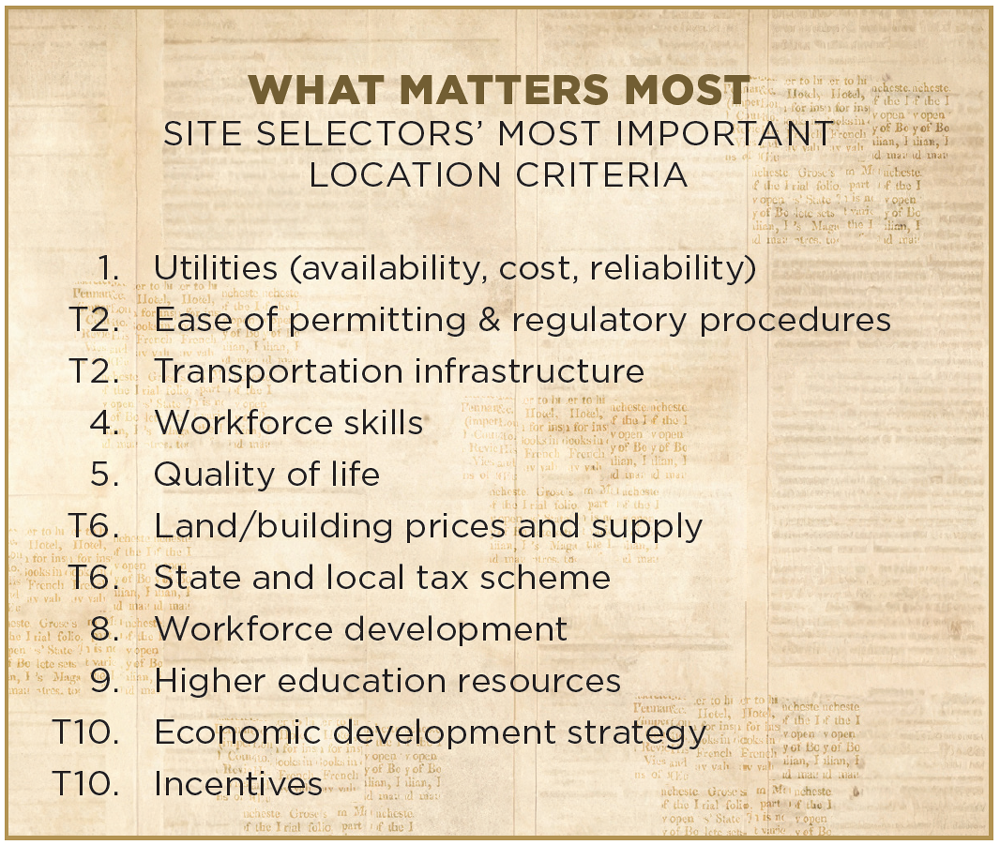
Earlier this year I signed into law Senate Bill 6 to help make transmission planning and approval even more efficient in Texas. The Public Utility Commission of Texas recently approved the state’s first 765-kilovolt transmission lines in West Texas, supporting the growing electricity needs of the region and the state.
Additionally, the weatherization requirements for critical grid and natural gas infrastructure that I signed into law have proven effective. Working together with innovators in tech and energy, we continue to add more reliable power to the grid to ensure every Texas home and every Texas business has the power needed to thrive.
How has the tariff climate in 2025 affected the state’s business climate?
Abbott: Texas stands ready to help companies navigate this global trade transition. We are working to help identify any opportunities to ensure that companies doing business here succeed globally.
As the number one exporter in the nation for the last 23 years in a row, Texas is strategically positioned to lead. Thanks to our central geographic location and state-of-the-art infrastructure, we are the gateway to global trade for the entire nation.
Our business-friendly climate is steadfast, and we are here as long-term partners for success to help companies revaluate and pivot during this new era of global trade. Texas is an economic development powerhouse, and we welcome new jobs and manufacturing from global businesses looking to expand or relocate their operations.
Dallas is quickly becoming a financial services hub, particularly where securities exchanges are concerned. Why has this sector seen so much activity lately?
Abbott: Home to the new “Y’all Street,” Texas is now the financial capital of America. In fact, Texas has the largest financial services workforce in the nation, even surpassing New York.
With the historic announcement of the Texas Stock Exchange in 2024 and the selection of Texas as the location for Nasdaq’s new regional headquarters in 2025, our state also recently celebrated the launch of NYSE Texas, a fully electronic equities exchange headquartered in Dallas.
With plenty of room to grow, many financial services companies are choosing to invest in Texas. Finance and insurance firms announced more than $137 million in new capital investment in Texas last year alone.
In 2021, Fortune 500 firm Charles Schwab relocated its headquarters from California to the North Texas city of Westlake to take advantage of lower costs and a business-friendly environment. Additionally, JPMorgan Chase has more employees in Texas than in New York.
Recently, Scotiabank, one of the largest banks in North America, announced a new major office in Dallas, creating more than 1,020 new jobs and more than $60 million in capital investment. Texas’ strength in financial services will only continue to grow as we expand our leadership in financial technology, data centers, AI, cybersecurity and more.
What are some business climate challenges you plan to address going forward?
Abbott: Here in Texas, we partner with our businesses. Because when businesses succeed, all Texans succeed.
With the eighth-largest economy in the world at more than $2.7 trillion, Texas is a beacon of freedom and opportunity that draws people and businesses from all over the world to our great state. We will continue to make strategic investments and partner with businesses to ensure that Texas remains the Best State for Business in the nation — a title we have held for the last 21 years in a row.
The recognition of Texas’ business climate is not something that happens in a vacuum. It takes the work of our state leadership and elected officials to ensure regulations continue to support the business-friendly climate that we are so proud of.
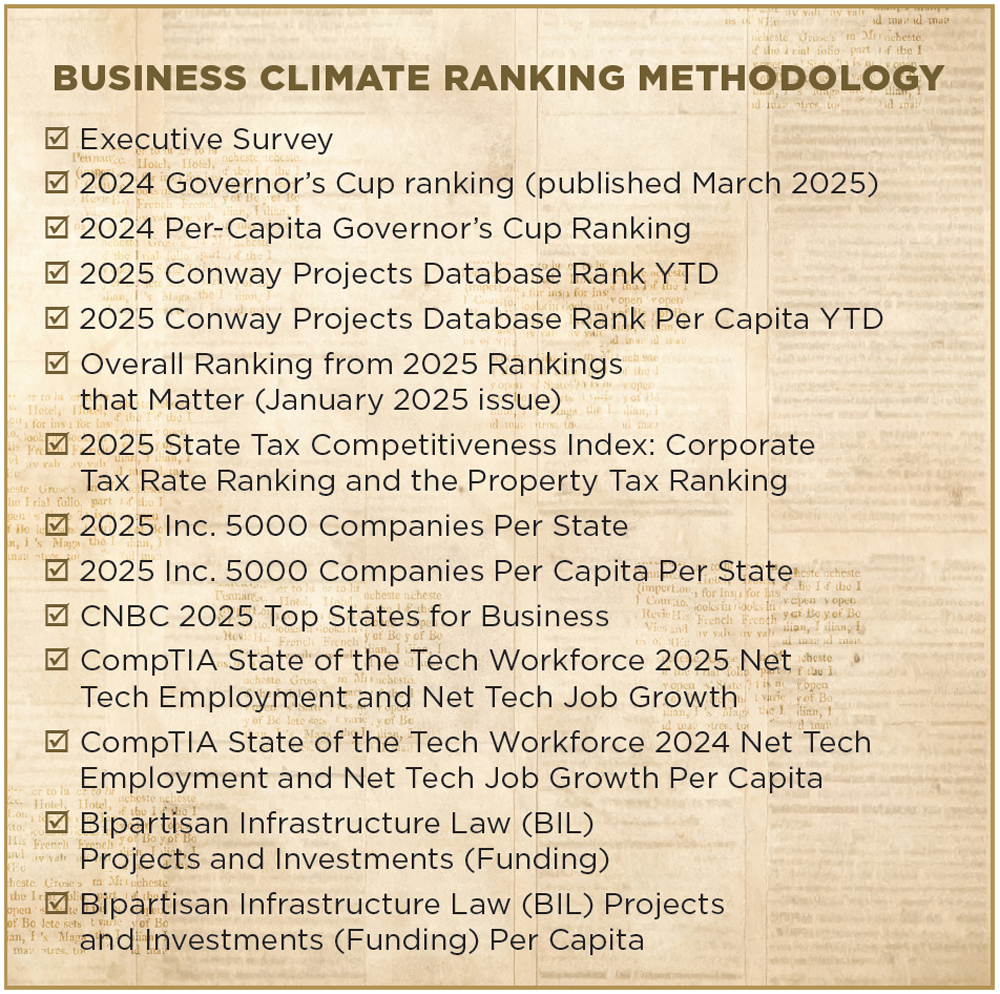

Austin, Texas is home to a younger, growing population.
Photo: Getty Images
The Talent Magnet
By Dr. M. Ray Perryman
Alarge, growing, and well-qualified workforce is essential to ongoing economic expansion. Texas has an advantage over many areas in that our population is younger and, hence, has more people in childbearing age ranges. Additionally, the state has long been attracting workers from other parts of the country (and, indeed, the world). A recent report by Lightcast, a global labor market intelligence firm, illustrates just how well Texas is doing.
Lightcast’s Talent Attraction Scorecard ranks states on seven components. The analysis looks at overall job growth over the past five years at an occupational level, then becomes more specific by delving into the numbers in high-earnings categories and blue-collar categories. Growth in the college-educated population and prime-age (25-54) population is considered, as well as people arriving with incomes above $25,000 per year. How an area is performing as a result of competitive advantages rather than overall national trends is also part of the ranking.
Texas had three of the top 10 large (250,000+ residents) metropolitan areas. Dallas-Fort Worth-Arlington topped the list by a very large margin. Austin-Round Rock-San Marcos was second, and Houston-Pasadena-The Woodlands was sixth. All other metro areas on the list were in Florida (which led Texas slightly on an overall statewide basis). At the other end of the spectrum were the greater Los Angeles (ranked last at 196), New York, Chicago, San Francisco, Pittsburgh and Boston areas.
A variety of factors influence in-migration. One is a dynamic economy. Texas has been a growth leader for a number of years, generating jobs across a broad spectrum of industries. These opportunities attract skilled workers, and the state’s sustained economic momentum is clearly a factor. Another advantage is the cost of living. It’s no coincidence, for example, that the states where people are attracted have no state income tax. In some of the areas losing talent in greatest numbers, there are not only state income taxes, but also substantial local taxes and particularly hefty levies on high-income individuals. When combined with higher costs for housing and other necessities, the financially rational decision can quickly shift toward Texas, Florida and other less expensive places to live.
Momentum builds momentum. Good opportunities attract talent, which helps businesses expand and create yet more opportunities. Texas has been dominating major locations and expansions for well over a decade. The state is also attracting workers needed for continued growth. There are daunting challenges going forward, including providing adequate educational opportunities, electric power, water and other infrastructure to facilitate further expansion, and overcoming perceptions discouraging some knowledge workers from coming to or remaining in the state. For now, however, Texas is well positioned to remain one of the most dynamic economies in the nation. Stay safe!
Dr. Ray Perryman is founder and CEO of The Perryman Group, an economic and financial analysis firm based in Waco, Texas. This column was published in syndication on September 17, 2025, and is reprinted here with permission.
Data entry and analysis for this report conducted by Karen Medernach, McKenzie Wright, Brian Espinoza and Daniel Boyer.
